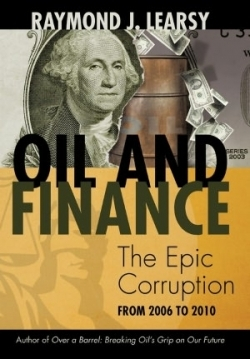Oil and Finance
The Epic Corruption, from 2006 to 2010
America runs on oil and gasoline, but it’s money that makes the world go ‘round, a fact that Raymond Learsy illuminates poignantly in his collection of essays Oil and Finance: The Epic Corruption. Unfortunately, as Learsy reveals, much of that money is being transferred steadily out of the United States in the form of payments to oil-producing countries, or squandered in the service of US oil company interests. Saudi Arabia bears the brunt of Learsy’s criticisms, as he pokes holes in many of OPEC’s standard excuses for limiting oil supply. However, Learsy does not withhold his ire for government policies in the United States; in several essays he explains how the misuse of the Strategic Petroleum Reserve has consistently contributed to high oil prices. He castigates the Commodity Futures Trading Commission, and demonstrates how in a world where few oil traders have ever actually received or stored a barrel of oil, one single trader can disproportionately manipulate prices resulting in massive price increases for the US and all other oil consumers.
Learsy draws on his extensive experience in commodities trading in these essays (originally published in The Huffington Post), and it’s difficult to imagine anyone more qualified to throw stones at US energy policy. Learsy is a member of the Woodrow Wilson International Center for Scholars, and his writings on the international oil trade have appeared in The New York Times, Pipeline & Gas Journal, and National Review Online.
There is no shortage of provocative statements in Oil and Finance, but Learsy is at his best when he not only condemns current practices, but also proposes surprising yet logical solutions. For example, in discussing Saudi Arabia’s leadership of OPEC, Learsy states that “Perhaps the time has passed for considering sovereign rights sacrosanct…,” pointing out that the majority of oil interests in the world are controlled by countries, not companies, which provides immunization from many fair-practice laws, and makes the oil game a matter not of markets, but of national security. Also fascinating is his insight into the 2008 bank bailouts, including the revelation that several large banks misused TARP funds to involve themselves in commodities speculation, particularly oil.
The book’s only shortcomings are perhaps inherent flaws, due to its very nature. Being a collection of essays written from 2006 to 2010, there is some duplication of fact and verbiage, which the author acknowledges in his introduction. Instead of chronological order, the essays are grouped by topic, and while this does help to provide focus, it sometimes makes it difficult to view the full, wider picture. Still, for anyone who’s wondered how we went from gasoline at a buck-fifty per gallon to crossing the $4 per gallon mark in just a few years, this is essential reading.
One can only hope that the book’s subtitle, “from 2006 to 2010,” will one day come to represent a time span aberrant in history; if it does not, our consolation is that at least we will have authors like Raymond Learsy to keep us informed.
Reviewed by
Peter Dabbene
Disclosure: This article is not an endorsement, but a review. The publisher of this book provided free copies of the book and paid a small fee to have their book reviewed by a professional reviewer. Foreword Reviews and Clarion Reviews make no guarantee that the publisher will receive a positive review. Foreword Magazine, Inc. is disclosing this in accordance with the Federal Trade Commission’s 16 CFR, Part 255.

